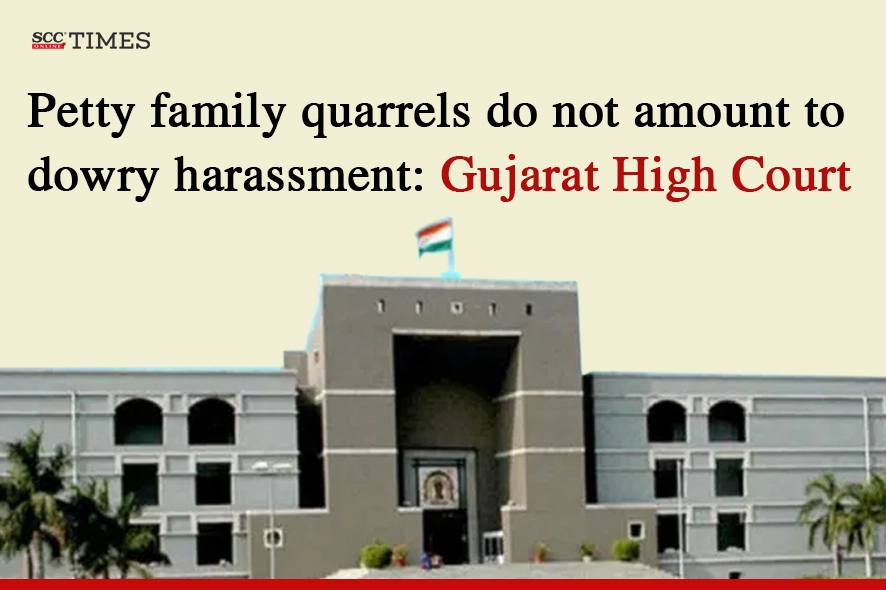Gujarat High Court: In a criminal appeal filed against the judgement dated 28-5-2014 passed by the Trial Court, whereby the accused persons were acquitted of the charges under Sections 498-A, 306, 304-B and 114 of the Penal Code, 1860 (IPC) read with Sections 3 and 7 of the Dowry Prohibition Act, 1961 (Dowry Act), the Division Bench of Cheekati Manavendranath Roy* and D. M. Vyas, JJ, upheld the Trial Court’s order of acquittal and stated that petty quarrels and bickering that are common in family life do not amount to ‘cruelty’ under Section 498-A of the IPC and cannot be called dowry harassment.
Background
The deceased wife and her husband had been married for 4 years and had a one-and-a-half-year-old son from the wedlock; furthermore, she was expecting again. The deceased and her mother-in-law had a strained relationship and often quarreled. It was stated that even on the day of her death, the deceased and her mother-in-law had quarreled, aggrieved by which, the deceased had gone into a room, poured kerosene, and set herself ablaze.
The parents of the deceased had filed an FIR against the accused persons, alleging that the deceased was being constantly harassed for additional dowry and was beaten by her husband at the insistance of her mother-in-law because of which she had been driven to commit suicide.
Additionally, the dying declaration given by the deceased stated that she was being harassed by her husband and mother-in-law, and unable to bear the harassment meted out by them, she had poured kerosene and set herself ablaze.
The Trial Court had acquitted the accused persons charged under Sections 498-A, 306, 304-B and 114 of the IPC read with Sections 3 and 7 of the Dowry Act.
Aggrieved with the acquittal, the instant appeal was filed challenging the impugned order of the Trial Court.
Analysis, Law and Decision
The Court noted that a conjoint reading of Section 304-B of the IPC and Section 113-B of the Evidence Act, 1872 made it clear that to prove the offence of dowry death, it must be shown that the deceased was treated cruelly or harassed within 7 years of marriage and that the cruelty or harassment meted out to her was for, or in connection with, demand for dowry. In the instant case, there was no evidence on the record to show that the deceased had been harassed for dowry by her in-laws.
The Court also noted that, while the deceased’s mother had initially alleged that the accused had harassed the deceased for dowry; however, during the deposition she had turned hostile. Thereafter, the basic requisites under Section 304-B of the IPC could not be proved to establish dowry death.
“Every harassment, which is not relating to demand for dowry, will not come within the purview of the offence of dowry death as contemplated under Section 304-B of the IPC”.
The Court further noted that the dying declaration of the deceased mentioned neither any demand for dowry nor any harassment meted out in connection with any such demand for dowry.
The Court referred to Section 498-A of the IPC that defines cruelty as any willful conduct that would drive a woman to cause grave injury to herself, or any form of harassment for demand of property or money, and opined that the prosecution had failed to prove any such willful conduct on part of the accused persons. Therefore, it could not be said that the deceased had been treated cruelly because of which she had been driven to commit suicide.
The Court further opined that the deceased’s decision to end her life over normal bickering that took place in the house could be due to her sensitive mind or emotional temperament, and the same could not be attributed to the conduct of the accused to hold him guilty for abetment to suicide.
The Court further stated that every petty quarrel or disagreement in the house, which is common in any family life, could not be construed as harassment made in connection with demand for dowry.
Upon re-appraisal of the evidence on record, the Court held that the Trial Court had arrived at the correct conclusion and no case had been made out for any of the charges levelled against the accused. Thereafter, the Court dismissed the instant appeal.
[State of Gujarat v. Paresh Shantilal, 2025 SCC OnLine Guj 2587, decided on 27-6-2025]
Order by: Justice Cheekati Manavendranath Roy
Advocates who appeared in this case :
For the Appellant: Bhargav Pandya (APP)



